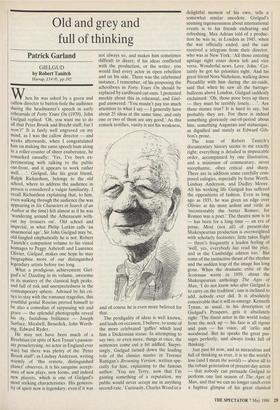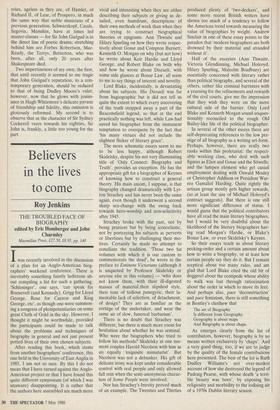Old and grey and full of thinking
Patrick Garland
GIELGUD When he was asked by a green and callow director to button-hole the audience during the headmaster's speech in early rehearsals of Forty Years On (1970), John Gielgud replied: 'Oh, you want me to do all that Peter Brook and Brecht stuff, but I won't!' It is fairly well engraved on my mind, as I was the callow director — and weeks afterwards, when I congratulated him on making the same speech hum along in a roller-coaster of sheer exuberance, he remarked casually: 'Yes, I've been ex- perimenting with talking to the public out-front, and it appears to work rather well. . .'. Gielgud, like his great friend, Ralph Richardson, belongs to the old school, where to address the audience in person is considered a vulgar familiarity. I recall Richardson explaining that, to him, even walking through the audience (he was appearing in Six Characters in Search of an Author at the time) felt almost as if he was 'wandering around the Athenaeum with- out my trousers on'. Old school and imperial, in what Philip Larkin calls 'an unarmorial age', Sir John Gielgud may be, old-fangled emphatically he is not. Robert Tanitch's companion volume to his visual homages to Peggy Ashcroft and Laurence Olivier, Gielgud, makes one hope he may biographise more of our distinguished legendary artists before too long.
What a prodigious achievement Giel- gud's is! Dazzling in its volume, awesome In its mastery of the classical high peaks, and full of risk and unexpectedness in the contemporary sphere. Advised by his cri- tics to stay with the romance tragedies, this Youthful genial Roscius proved himself to be also a comedian of surpassing wit and grace — the splendid photographs reveal his sly, fastidious brilliance — Joseph Surface, Mirabell, Benedick, John Worth- ing, Edward Ryder.
He may not have been much of a Brechtian (in spite of Ken Tynan's passion- ate proseletysing, no actor in England ever was) but there was plenty of the 'Peter Brook stuff'; as Lindsay Anderson, writing warmly of 'this remote, distinguished Planet' observes, it is his sanguine accept- ance of new plays, new forms, and indeed new players, which is one of Gielgud's most striking characteristics. His generos- ity of spirit now is legendary, even if it was not always so, and makes him sometimes difficult to direct; if his ideas conflicted with the production, or the writer, you would find every actor in open rebellion and on his side. There was the celebrated instance, I remember, of his proposing the schoolboys in Forty Years On should be replaced by cardboard cut-outs. I protested meekly about this in rehearsal, and Giel- gud answered: 'You mustn't pay too much attention to what I say — I generally have about 25 ideas at the same time, and only one or two of them are any good.' As this remark testifies, vanity is not his weakness, and of course he is even more beloved for that.
The prodigality of ideas is well known, and leads on occasion, I believe, to some of the more celebrated 'gaffes' which lend him a Dickensian status. In attempting to say two, or even more, things at once, the sentences come out a bit addled. Surpri- singly, Gielgud turned down the leading role of the classics master in Terence Rattigan's Browning Version, written spe- cially for him, explaining to the famous author: 'You see Terry, now that I'm gaining something of a reputation, my public would never accept me in anything second-rate.' Curiously, Charles Wood in a delightful memoir of his own, tells a somewhat similar anecdote. Gielgud's seeming ingenuousness about international events is to his friends endearing and refreshing. Max Adrian told of a produc- tion he wis in, in London in 1945, when the war officially ended, and the cast received a telegram from their director, who was in New York: 'All those entering upstage right enter down left and vice versa. Wonderful news. Love. John.' Cer- tainly he got his priorities right. And his great friend Nora Nicholson, walking down Piccadilly with him during the air-raids, said that when he saw all the barrage- balloons above London, Gielgud suddenly exclaimed: 'Oh, those poor boys up there — they must be terribly lonely. . .'. Are these stories true? It is hard to say, but probably they are. For there is indeed something gloriously out-of-period about him, something Augustan and statuesque, as dignified and stately as Edward Gib- bon's prose.
The tone of Robert Tanitch's documentary history seems to me exactly right; everything is detailed in impeccable order, accompanied by one illustration, and a minimum of commentary, never sycophantic, often critical and sharp. There are in addition some carefully com- posed eulogies, especially by Irene Worth, Lindsay Anderson, and Dudley Moore. All his working life Gielgud has suffered the oppositions of fashion. Even as long ago as 1935, he was given an edge over Olivier at his most ardent and virile as 'incontestably the better Romeo, for Romeo was a poet.' The theatre now is in — has been for a long time — an era of prose. Most (not all) of present-day Shakespearian production is overweighted with scholarly footnotes; little takes flight — there's frequently a leaden feeling of 'well, yes, everybody has read the play, and in the Cambridge edition too.' But some of the instinctive thrust of the rhythm and the sudden leap of the image has long gone. When the dramatic critic of the Scotsman wrote in 1959, about the Shakespearian anthology The Ages of Man, 'I do not know who after Gielgud is to carry on the tradition', one is inclined to add, nobody ever did. It is absolutely conceivable that it will re-emerge. Kenneth Tynan, as usual, in his description of Gielgud's Prospero, gets it absolutely right: 'The finest actor in the world today from the neck up — his face is all rigour and pain — his voice, all 'cello and woodwind. But he speaks the great pas- sages perfectly, and always looks full of thinking.'
Just past 84 now, and as miraculous and full of thinking as ever, it is to the world's loss (and I mean the world) — above all to the robust generation of present-day actors — that nobody can persuade Gielgud to perform one last season of The Ages of Man, and that we can no longer catch even a fugitive glimpse of his great classical roles, ageless as they are, of Hamlet, of Richard II, of Lear, of Prospero, in much the same way that noble musicians of a previous generation, Schwarzkopf, CasaIs, Segovia, Menuhin, have at times led master-classes — for Sir John Gielgud is in the direct line of poetic drama; stretching behind him are Forbes Robertson, Mac- Ready, the Terrys, Betterton, who was born, after all, only 20 years after Shakespeare died.
Two impertinences of my own; the first, that until recently it seemed to me tragic that John Gielgud's reputation, to a con- temporary generation, should be reduced to that of being Dudley Moore's valet; however, now that he glows with jouiss- ance in Hugh VVhitemore's delicate pavane of friendship and fidelity, this omission is gloriously reformed. My second is to observe that as the character of Sir Sydney Cockerell veers towards his eighties, Sir John is, frankly, a little too young for the part.























































 Previous page
Previous page